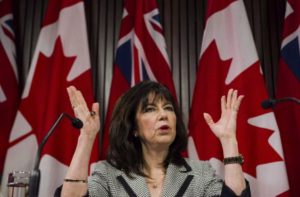Auditor General calls for independent review of schools funding formula:
 On December 6th in Toronto, Auditor General Bonnie Lysyk released her 2017 Annual Report. The report includes 14 different audits that focus on provincial government spending. Two audits in particular are relevant to Ontario school boards and public education:
On December 6th in Toronto, Auditor General Bonnie Lysyk released her 2017 Annual Report. The report includes 14 different audits that focus on provincial government spending. Two audits in particular are relevant to Ontario school boards and public education:
- Ministry Funding and Oversight of School Boards
In the 2016/17 school year, the Ministry and municipalities combined provided school boards with $23 billion in operating funding. The audit reviewed whether the Ministry has effective oversight procedures to ensure that operating funds are used by the school boards in accordance with legislation, contractual agreements and Ministry policy, and are achieving the desired education outcomes.
Highlights of Audit Findings:
- Ministry needs to improve its oversight of school boards in certain areas.
- Ministry gives school boards considerable discretion in how they spend the funding they receive despite some funding being provided for specific education priorities.
- A 2002 independent task force recommended that the Ministry annually review and update the benchmarks used in the funding formula and conduct a more comprehensive overall review every five years. Fifteen years later, the Ministry has not commissioned another independent review of the funding formula.
- Grants for specific education priorities are not always allocated to school boards according to actual student needs.
- The Ministry is not ensuring that funding for specific education priorities is being spent as intended. In 2016/17, only 35% of $10.9 billion in special purpose funding was restricted in use. Except for restricted funding, the Ministry does not require boards to report how the individual grants that comprise the overall Grants for Student Needs were spent, even if those grants were provided for certain reasons.
- The Ministry does not compare and analyze actual expenses of school boards on a per student or per-school basis. Such analysis could help the Ministry identify boards that are not operating efficiently or highlight where further review is necessary.
- School Boards’ Management of Financial and Human Resources
School boards are responsible for promoting student achievement and well-being, and for effective stewardship of resources. In the 2016/17 school year, school boards received $23 billion from the Ministry of Education. The audit assessed whether select Ontario district school boards in southern Ontario had effective systems and procedures in place to ensure that their use of operating funding from the Ministry complies with legislation, government directives and transfer payment funding arrangements and is achieving desired education outcomes. It also assessed whether resources are acquired with due regard for economy and are used efficiently.
Four school boards were audited for this report: Hamilton-Wentworth DSB, Hastings & Prince Edward DSB, Toronto Catholic DSB and Halton Catholic DSB.
Highlights of Audit Findings:
- From the 2011/12 school year to the 2015/16 school year, three of the four boards visited noted an increase in employee sick days ranging from 11% to 40%. Over the same five-year period, for three boards for which information was readily available, salary costs paid to employees while they were off sick increased by 32% to $42.7 million in the 2015/16 school year.
- The Ministry provides funding for students at risk of low academic achievement through the Learning Opportunities Grant. The boards have discretion on how they can spend much of this funding and one school board used only 50% of the $46.5 million it received for at-risk students, while the remaining funds were used to support shortfalls in teacher salaries and special education funding.
- The Ministry provides funding to all English school boards for English as a second language/English literacy development. For the 2015/16 school year, one school board used 58% of the $23.9 million it received for English as a second language students, and the remainder was used to alleviate cost pressures in other areas.
- The Education Act, 1990 (Act) requires that boards allocate resources to improve student achievement in areas where students are performing below provincial benchmarks. Only one of the boards visited attempted to create smaller classes in schools with lower student achievement. The other boards allocated teaching positions based on meeting provincial class size restrictions.
- All four boards visited had long lists of students waiting to be assessed or served by professionals in the areas of psychology and speech and language. For three of the four boards, 24% or more of the students on the psychological services wait lists had been waiting for more than a year. In addition, two boards had students waiting more than a year for speech and language assessments.
- None of the four boards visited completed the two mandatory appraisals for all new teachers within 12 months of being hired, as required under the Act. The lack of timely appraisals impacts the new teachers’ ability to receive feedback and seek the timely professional development required to be successful in the profession.
Recent Posts


